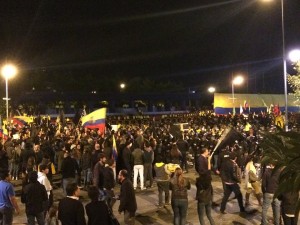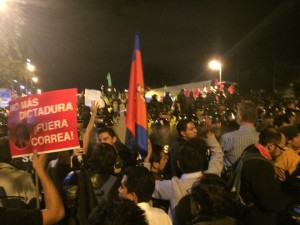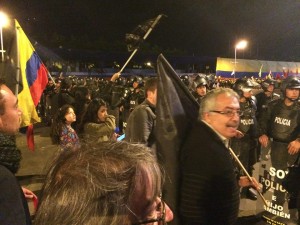Ecuador: ¿Ama la Vida?
“Fuera, Correa, fuera! Fuera, Correa, fuera!” It’s another June night in Quito and from my host family’s sixth floor apartment, my abuela and I hear sounds of protest outside. An hour before, I sat in a café with my friends watching Jose Nebot, the mayor of Guayaquil (the largest city in Ecuador), rally an enormous crowd to “stand together for democracy” on television. After Mayor Nebot finished his speech, I looked out the window to see a myriad of people dressed in black (the color of the protest) walk toward the area near my apartment where many demonstrations, both for and against the government, take place. The black represents mourning, as protesters believe their country is suffering.
 Before travelling to Ecuador, Rafael Correa was not a familiar name to me, even after taking a Spanish class that focused on Latin America. The only media attention I saw him receive was in the form of short comedic segments by John Oliver. This changed drastically when I arrived in Quito, where I became constantly surrounded by conversations revolving around the actions of President Rafael Correa. President Correa came to power in 2007, which is significant because prior to his election, the country had seven presidents in ten years. Although Correa created great gains for Ecuador, his increasing control of government power concerns many. Not only does Correa show a distaste for private media (proclaiming it “a dictatorship”), but he also uses a law that requires the media to carry government messages as a way to respond to his critics, leaving many to wonder about his position on freedom of speech. My host mother was among those upset with Correa, especially when his announcement about the demonstrations interrupted her telenovela.
Before travelling to Ecuador, Rafael Correa was not a familiar name to me, even after taking a Spanish class that focused on Latin America. The only media attention I saw him receive was in the form of short comedic segments by John Oliver. This changed drastically when I arrived in Quito, where I became constantly surrounded by conversations revolving around the actions of President Rafael Correa. President Correa came to power in 2007, which is significant because prior to his election, the country had seven presidents in ten years. Although Correa created great gains for Ecuador, his increasing control of government power concerns many. Not only does Correa show a distaste for private media (proclaiming it “a dictatorship”), but he also uses a law that requires the media to carry government messages as a way to respond to his critics, leaving many to wonder about his position on freedom of speech. My host mother was among those upset with Correa, especially when his announcement about the demonstrations interrupted her telenovela.

While there were tensions over Correa’s controversial actions before my arrival, the large anti-government protests began when two bills regarding the distribution of private money were proposed: the inheritance and capital gains tax. “El Impuesto a las Herencias” puts restrictions on large transfers of money to family members, which can include stocks of businesses. For Ecuador, where businesses are 95% family-owned, economists believe this will hurt the country’s economy. The bills aimed to tax inheritances up to 77.5% and tax capital gains up to 75%. For one student’s host family, in which three generations live together, the family’s home could be at stake as a result of this tax. Defending their rights, the entire family created black flags and brought them to the anti-government demonstrations.
The tensions between government supporters and protesters increased even more at the arrival of Pope Francis on July 5. As Ecuador’s population is 74% Catholic, the entire country invested in preparations for the pope’s arrival. In Quito, one could see hundreds of banners featuring Pope Francis and a number of biblical quotes. Some believe that these quotes about social inequality were specifically chosen in order to prove the Pope’s backing of the government’s leftist policies.
 In order to prevent ongoing tensions from exploding upon the Pope’s arrival, President Correa decided to temporarily postpone his major tax proposals in order to “give the public time to debate.” However, the protests still continued as a result of his unpopular actions. Unfortunately, I booked my tickets to leave the day the Pope arrived and was unable to see the protesters react to his arrival. However, my host mother told me the prepared slogan before I left – “El papa, si! Correa, no!” According to my fellow students who stayed longer, the crowds cheered as the Pope passed but immediately booed as Correa followed. Obviously, it does not appear that the Ecuador will be quieting down anytime soon, and I hope the international community is prepared to hear the noise of this small, “quiet” Latin American country.
In order to prevent ongoing tensions from exploding upon the Pope’s arrival, President Correa decided to temporarily postpone his major tax proposals in order to “give the public time to debate.” However, the protests still continued as a result of his unpopular actions. Unfortunately, I booked my tickets to leave the day the Pope arrived and was unable to see the protesters react to his arrival. However, my host mother told me the prepared slogan before I left – “El papa, si! Correa, no!” According to my fellow students who stayed longer, the crowds cheered as the Pope passed but immediately booed as Correa followed. Obviously, it does not appear that the Ecuador will be quieting down anytime soon, and I hope the international community is prepared to hear the noise of this small, “quiet” Latin American country.
Images courtesy of Christina Johnson.
